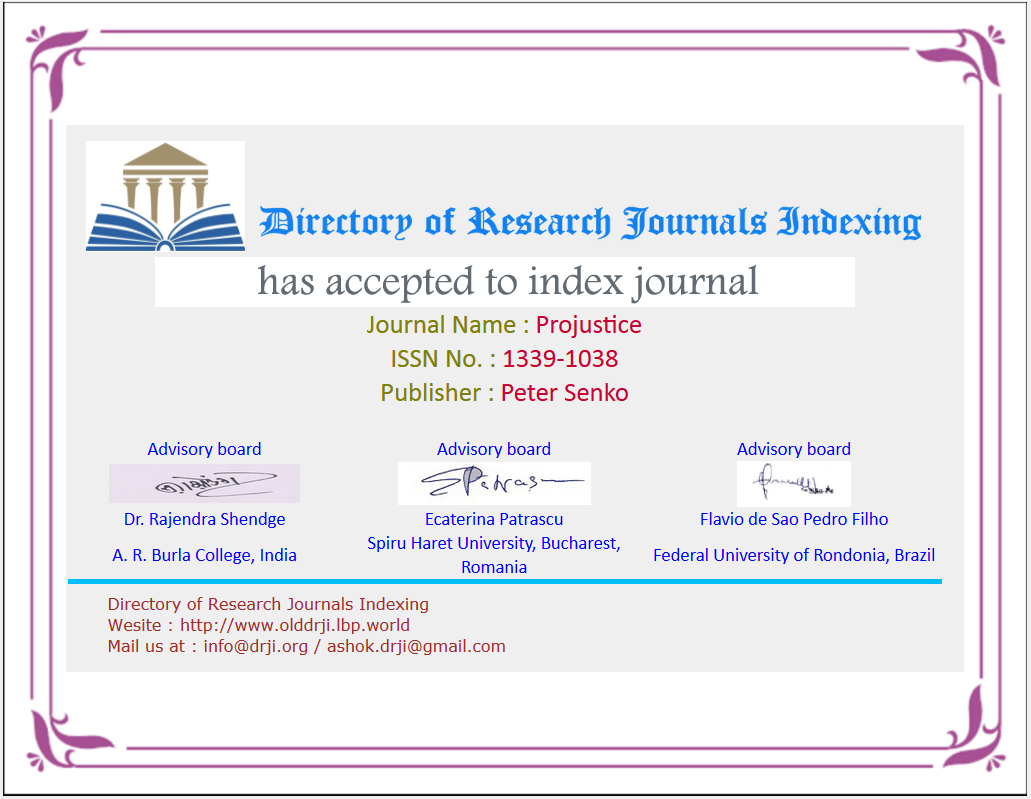Negatívne následky absencie skutkovej podstaty trestného činu postihujúceho pokútnych liečiteľov v právnom poriadku Slovenskej republiky
Negative consequences of the lack of factual nature of a criminal offense affecting fine therapists in the legal order of the Slovak Republic
Abstrakt: V právnom poriadku Slovenskej republiky absentuje pojem liečiteľ, neexistuje právna úprava, ktorá by upravovala ich právne postavenie či status, z toho vyplývajúce práva a povinnosti, ako aj otázku zodpovednosti a neexistuje ani osobitný právny predpis, ktorý by reguloval vykonávanie ich činnosti. Z dôvodu, že právny poriadok nedefinuje pojem liečiteľ, ako liečiteľ môže vystupovať v podstate každý, aj bez medicínskych vedomostí, čo znamená, že svoju činnosť môže vykonávať prakticky bez obmedzenia. Žiadny právny predpis nevymedzuje podmienky, ktoré by osoba musela splniť, ak by sa rozhodla vykonávať činnosť liečiteľa. Jediné právne limity pre činnosť liečiteľa stanovuje Trestný zákon, avšak v nedostatočnom rozsahu, nakoľko neexistuje žiadna skutková podstata trestného činu, ktorá by postihovala pokutných liečiteľov vykonávajúcich svoju činnosť za odmenu bez splnenia príslušných kvalifikačných predpokladov.
Aká je teda hranica medzi pokutným liečiteľstvom, ktoré vykonávajú šarlatáni za odmenu za účelom obohatenia sa a medzi činnosťou obyčajných bylinkárok, predávajúcich napríklad čaje alebo hojivé masti, ktoré v súčasnosti využíva takmer každý z nás? Práve týmto článkom by sme chceli poukázať na nevyhnutnosť zavedenia právnej úpravy liečiteľstva vykonávaného bez splnenia kvalifikačných predpokladov za odmenu do nášho právneho poriadku, nakoľko diskusia ohľadom zavedenia nového trestného činu neoprávneného výkonu regulovanej činnosti, ktorý mal patriť medzi trestné činy ohrozujúce trhovú ekonomiku sa viedla už v roku 2015, no žiaľ bezúspešne.
Kľúčové slová: liečiteľ, Trestný zákon, poškodenie zdravia, neoprávnené podnikanie
Abstract: In the legal order of the Slovak Republic there is no term healer, there is no legal regulation and there is no specific legal regulation regulating the performance of their activities. Due to the fact that the law does not define the term healer, the healer can be virtually everybody, even without medical knowledge, which means that he can practice practically without limitation. No legislation defines the conditions that a person would have to fulfill if he decides to pursue the activity of the healer. The only legal limits to the healer's activity are set by the Criminal Law, but to the extent that there is no fact whatsoever that would penalize fine therapists performing their activities for remuneration without fulfilling the relevant qualification assumptions.
What, then, is the boundary between fine therapies that make charlatans a reward for enrichment and the activity of ordinary herbs that sell, for example, teas or healing ointments that are currently used by everyone? It is with this contribution that I would like to point out the necessity of introducing the legislation of the healing performed without fulfilling the qualification prerequisites for rewarding our legal order because the discussion about the introduction of a new offense of unauthorized exercise of regulated activity that belonged to crimes that threatened the market economy was already in 2015, but unfortunately unsuccessful.
Key words: healer, the Criminal code, damage to health, unauthorized business







